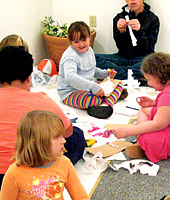 |
|
Spring 2008 | Volume 31, Number 1
| Campus
|
|
|
Faculty, Students Offer Hope in Rural West Virginia
Appalachian partnerships

Children in Philippi’s after-school KidREACH program. |
Nestled among dense-wooded hills deep in the heart of Appalachia, the tiny town of Philippi, West Virginia, was at one time a booming coal-mining community. These days, however, Philippi and its surrounding region are considered one of the six poorest areas in the United States.
It’s also one of the least literate. “The adult population averages a third-grade reading level in Philippi,” says Debby Espinor, assistant
professor of education and director of placement and partnerships in Seattle Pacific University’s School of Education. “And because parents don’t read, the kids don’t read.”
Espinor first visited the community in 2004, while en route to a conference. She immediately recognized an outreach opportunity for SPU’s School of Education (SOE). Since then, Espinor has worked to find ways for SOE to engage with the region through a partnership with Christian relief organization World Vision, which has an office in the area.
One such opportunity materialized in late October 2007. “We had asked Kim Burnett, the director of World Vision Appalachia’s KidREACH program, what she needed most,” says Espinor. “And she told us reading assessments for all 120 children in her six after-school programs.”
Reading assessments measure student growth in areas such as phonological awareness, reading accuracy, and comprehension. By providing this data, the faculty in SOE could give Burnett the kind of information required to create a reading plan for each child — an important step in combatting Philippi’s low literacy rates.
Espinor and her team, which included five SOE faculty members and two graduate students, traveled to West Virginia to help Burnett. They planned to spend two days administering and analyzing a widely regarded set of reading measures known as Dynamic Indicators of Basic Early Literacy Skills, or DIBELS. But when they arrived, the plan changed.
“The principal of [Philippi’s] Mount Vernon Elementary School told us her school had already used DIBELS on their students,” says Espinor. Faced with invalidating the existing data if they continued the assessment, Espinor informed Burnett of the situation, and the SPU team retreated to rest and regroup.
That was the turning point of their visit. “We began to discuss a new plan,” explains Espinor. “After all, we were still in Philippi.
We still had time. So we made a list of questions for Kim.”
At the top of the list was, “What else can SPU do to help your efforts?” The answer: Many things. The existing DIBELS data could be analyzed by SPU faculty. SOE
students could create literacy games and resource packets for World Vision Appalachia volunteers to use with Philippi students. And Burnett could pursue her master’s degree in literacy through SPU’s online courses. (She began the program in January).
“It was around the dinner table on our last day that we began to fully understand why
we came,” Espinor says. “Burnett and other World Vision staff say they often feel isolated. With our visit, we brought encouragement and hope. You can’t measure those things.”
And that was a lesson the seasoned group
of educators didn’t expect to come out
of Philippi.
—Photo by Debby Espinor
Return to top
Back to Campus Home
|
| |
|
 |
|
 |